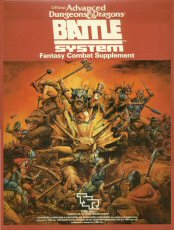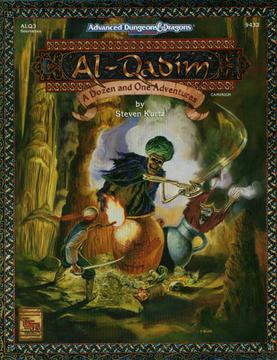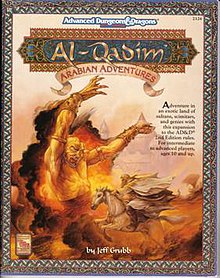Jeff Grubb is an author of novels, short stories, and comics, as well as a computer and role-playing game designer in the fantasy genre. Grubb worked on the Dragonlance campaign setting under Tracy Hickman, and the Forgotten Realms setting with Ed Greenwood. His written works include The Finder's Stone Trilogy, the Spelljammer and Jakandor campaign settings, and contributions to Dragonlance and the computer game Guild Wars Nightfall (2006).
Abeir-Toril is the fictional planet that makes up the Forgotten RealmsDungeons & Dragons campaign setting, as well as the Al-Qadim and Maztica campaign settings, and the 1st edition version of the Oriental Adventures campaign setting.
Al-Qadim is a campaign setting for the Dungeons & Dragons role-playing game which was developed by Jeff Grubb with Andria Hayday for TSR, Inc., and was first released in 1992. Al-Qadim uses One Thousand and One Nights as a theme and is set in the land of Zakhara, called the Land of Fate. Thematically, the land of Zakhara is a blend of the historical Muslim Caliphates, the stories of legend, and a wealth of Hollywood cinematic history. Zakhara is a peninsula on the continent of Faerûn in the world of Toril, the locale of the Forgotten Realms campaign setting, although Al-Qadim is designed to stand on its own or be added to any existing campaign setting. The basic campaign setting was divided between two game products: Al-Qadim: Arabian Adventures, a sourcebook describing character creation rules, equipment, and spells unique to the setting, and Al-Qadim: Land of Fate, a boxed set describing the land of Zakhara, with separate sourcebooks for the players and the Dungeon Master.

Battlesystem is a tabletop miniature wargame designed as a supplement for use with the Dungeons & Dragons role-playing game. The original Battlesystem was printed as a boxed set in 1985 for use with the first edition AD&D rules. For the second edition of AD&D, a new version of Battesystem was printed as a softcover book in 1989.
The flexibility of the Dungeons & Dragons (D&D) game rules means that Dungeon Masters (DM) are free to create their own fantasy campaign settings. For those who wanted a pre-packaged setting in which to play, TSR, Wizards of the Coast (WotC), and other publishers have created many settings in which D&D games can be based; of these, the Forgotten Realms, an epic fantasy world, has been one of the most successful and critically acclaimed settings. Many campaign settings include standard sword and sorcery environments, while others borrow Asian, Central American, swashbuckling, horror and even space-travel themes.

Al-Qadim: The Genie's Curse is an action role-playing game for the personal computer set in the Al-Qadim campaign setting of Advanced Dungeons and Dragons. The game was developed by Cyberlore Studios and published in 1994 by Strategic Simulations (SSI). The game combines role-playing game and adventure with a simplified interface; the player character is a young corsair trying to clear his family's name, rescue his betrothed and determine who has been freeing genies from their masters.
A sha'ir was a pre-Islamic Arab poet believed to have magical powers.
Jon Pickens is an American game designer and editor who has worked on numerous products for the Dungeons & Dragons fantasy role-playing game from TSR and later Wizards of the Coast.

The Complete Priest's Handbook is a supplemental rulebook published in 1990 for the 2nd edition of the Advanced Dungeons & Dragons fantasy role-playing game. Accompanying manuals are The Complete Fighter's Handbook, Thief's Handbook, and Wizard's Handbook.

Golden Voyages is an accessory for the 2nd edition of the Advanced Dungeons & Dragons fantasy role-playing game, published in 1992.

Land of Fate is an accessory for the 2nd edition of the Advanced Dungeons & Dragons fantasy role-playing game, published in 1992.

Assassin Mountain is an accessory for the second edition of the Advanced Dungeons & Dragons fantasy role-playing game, published in 1993.

A Dozen and One Adventures is an accessory for the 2nd edition of the Advanced Dungeons & Dragons fantasy tabletop role-playing game, published in 1993.

The Complete Sha'ir's Handbook is an accessory for the 2nd edition of the Advanced Dungeons & Dragons fantasy role-playing game, published in 1994.

Secrets of the Lamp is an accessory for the 2nd edition of the Advanced Dungeons & Dragons fantasy role-playing game, published in 1993.

City of Delights is an accessory for the 2nd edition of the Advanced Dungeons & Dragons fantasy role-playing game, published in 1993.

Corsairs of the Great Sea is an accessory for the 2nd edition of the Advanced Dungeons & Dragons fantasy role-playing game, published in 1994.

GURPS Arabian Nights is a supplement by Phil Masters, published by Steve Jackson Games in 1993 for GURPS.

In Hot Pursuit is a collection of four scenarios published by Mayfair Games in 1990 for the superhero role-playing game DC Heroes.













